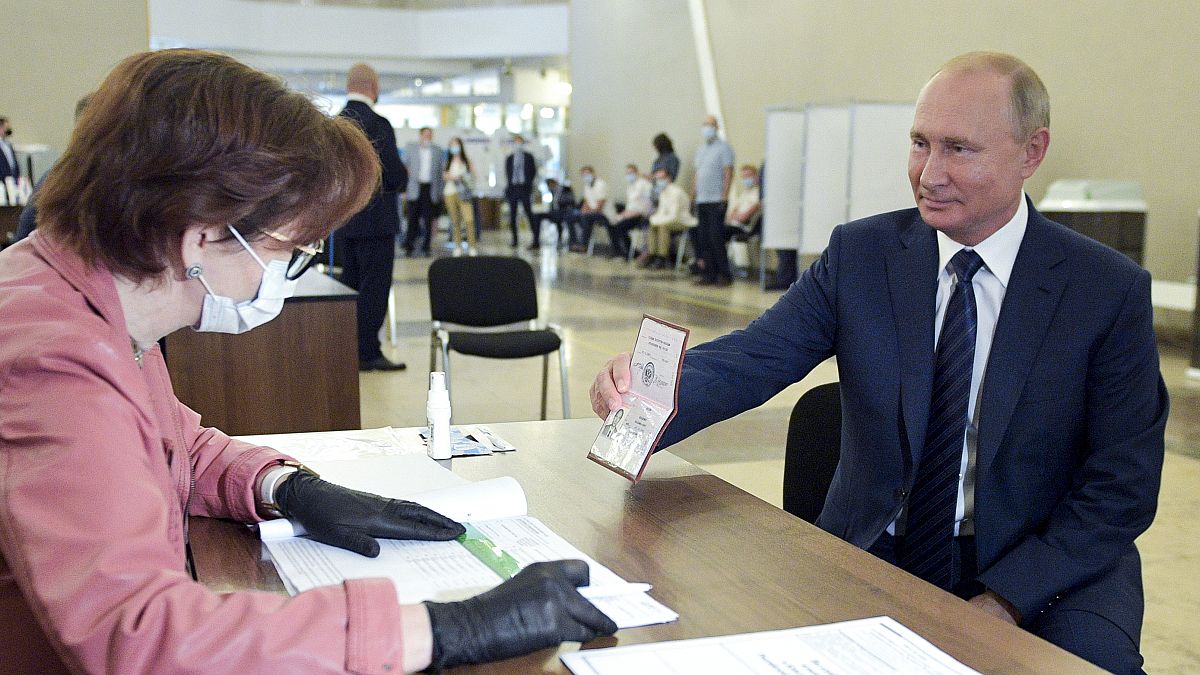Ballots from three-fourths of Russia's precincts have been counted, revealing 77.6% of voters have so far approved the Russian president's proposed amendments to the 1993 constitution.
Russia President Vladimir Putin could hold power until 2036 after voters overwhelmingly backed amending the constitution in a referendum tarnished by reports of pressure on voters and other irregularities.
Ballots from three-fourths of Russia's precincts have been counted, revealing 77.6% of voters have so far approved the Russian president's proposed amendments to the 1993 constitution.
The overall turnout was believed to be around 65% as polling stations closed in Moscow and Western Russia, while some regions reported a turnout of up to 90%.
Preliminary results in the eastern Chukchi Peninsula, which is nine hours ahead of Moscow, showed 80% had backed the changes, while other regions in the Far East said more than 70% were in agreement.
The vote marks the end of a historic election that saw ballots open for a full week to encourage a higher voter turnout and to avoid crowds amid the coronavirus pandemic.
But Kremlin critics have cast doubt over the motives of opening polling stations for this length of time, saying it could be used as a tool to manipulate the result.
They have also called into question the turnout figures.
Grigory Melkonyants, the co-chair of the independent election monitoring group Golos, top AP: "We look at neighbouring regions, and anomalies are obvious — there are regions where the turnout is artificially [boosted], there are regions where it is more or less real."
The political saga began back in January after Putin, 67, suggested the constitutional changes of broadening parliamentary powers and redistributing power among governmental bodies.
In March, just hours before a vote in the State Duma to approve proposals, the Russian president revealed his other motivations — to reset his number of presidential terms to zero.
This would, therefore, allow him to avoid being required to step down at the end of his current term in 2024, and allow him to run another two times.
Putin has said he is not yet decided on whether to actually run again in 2024, insisting that the constitutional changes would stop people "darting their eyes in search for possible successors".
But according to former Kremlin political consultant Gleb Pavlovsky, this move could actually highlight Putin's insecurity about his future.
He said: "Putin lacks confidence in his inner circle and he’s worried about the future. He wants an irrefutable proof of public support."
Authorities mounted a sweeping effort to persuade teachers, doctors, workers at public sector enterprises and others who are paid by the state to cast ballots. Reports surfaced from across the vast country of managers coercing people to vote.
The Kremlin has used other tactics to boost turnout and support for the amendments. Prizes ranging from gift certificates to cars and apartments were offered as an encouragement, voters with Russian passports from eastern Ukraine were bused across the border to vote, and two regions with large number of voters — Moscow and Nizhny Novgorod — allowed electronic balloting.
In Moscow, some journalists and activists said they were able to cast their ballots both online and in person in a bid to show the lack of safeguards against manipulations.
Kremlin critics and independent monitors pointed out that the relentless pressure on voters coupled with new opportunities for manipulations from a week of early voting when ballot boxes stood unattended at night eroded the standards of voting to a striking new low.
In Moscow, several activists briefly lay on Red Square, forming the number “2036” with their bodies in protest before police stopped them. Some others in Moscow and St. Petersburg staged one-person pickets and police didn’t intervene.
Several hundred opposition supporters later rallied in central Moscow to protest the changes, defying a ban on public gatherings imposed for the coronavirus outbreak. Police didn’t intervene and even handed masks to the participants.
